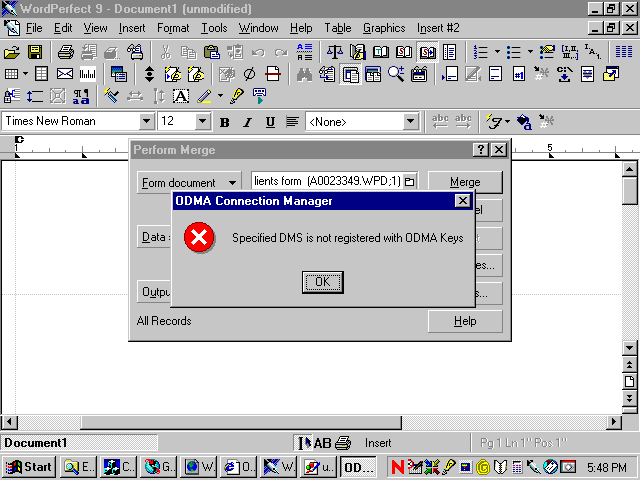The ODMA 2.0.0 Connection Manager implementations, ODMA32.dll
and Odma.dll, presents unwanted message windows under two
conditions:
INVDOCID:Invalid Document IDNODMS:Specified DMS is not registered with ODMA Keys
The messages that are produced are very plain in format:

Figure 1. ODMA Connection Manager Message (download BMP format)
If the user clicks "OK" the Connection Manager will then perform
the correct operation, which is to silently report the appropriate error
condition (e.g., ODM_E_DOCID) to the ODMA-aware application that originated the request.
These messages are inappropriate and unwanted for several reasons:
- The ODMA 2.0 Connection Manager is neither localized nor designed for internationalization.
- The ODMA 2.0 Connection Manager must support "batch" and unattended operation of ODMA-aware applications. The ability to avoid all operator interventions is a specific provision of ODMA 2.0. These messages defeat the provisions for silent operation.
- The ODMA Specifications
and implementation practices are based on the assumption that all interactive
activities are those of the DMS and of the ODMA-aware
application. The ODMA Connection Manager must passively
deliver error indications (via
ODMSTATUSresult codes) for problems detected by the Connection Manager itself or reported by the DMS. - The reported conditions are not fatal and may occur under ordinary conditions in which there is no actual problem. For example, when an ODMA Document ID is obtained as a link in a document, or from an E-mail message, it may well be that the originating DMS is not available on the computer in which access to the document is attempted. The inability to use the Document ID should simply be reported back to the application for treatment as an allowable though uncommon exception.
- There are well-defined
ODMSTATUSvalues for reporting any of these conditions:ODM_E_DOCID,ODM_E_NODMS, andODM_E_FAIL, and appropriate result codes will in-fact be delivered once the user clicks the "OK" button. - The message wording is not particularly informative. The message provides information that the user of the ODMA-aware application cannot be expected to comprehend nor understand the consequences of. It is far better to have the application provide an informative display, if even needed, depending on what operations are being performed at the application level.
Although the messages have been seen under conditions where there is an error in the application, these messages are inappropriate because they can occur when there is no actual defect. The messages are not required for, nor are they helpful for troubleshooting of, ODMA 2.0 operations. The ODMA 2.0 Connection Manager Trace Log is more informative and useful for any necessary troubleshooting.